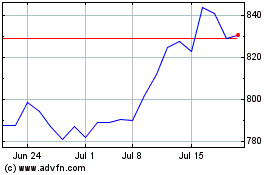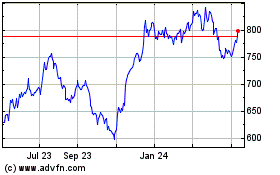UPDATE: Bond Group Sets Guidelines For Mortgage Repurchases
August 30 2011 - 2:42PM
Dow Jones News
A leading bond group on Tuesday proposed hiring of an
independent reviewer and other new guidelines that would hold
mortgage lenders accountable for the quality of their loans and
help restore investor confidence in private residential
mortgage-backed securities.
The American Securitization Forum created a model that lays out
steps for investigating and resolving disputes between investors
and the issuer of the bond, an attempt at eliminating the messy
negotiations that are costing both sides billions of dollars and
dealing a black eye to the RMBS market. Both sides came to a
consensus on guidelines after six months of negotiation, said Tom
Deutsch, executive director for the ASF.
Bringing issuers and investors together on the guidelines was
"challenging," yet "heartening" as they've had competing interests,
he said. One of the most important measures would be to establish
an independent reviewer that would have full access to information
needed to determine if a loan has breached its contract, he
said.
The fight between investors and banks, and investor infighting,
is playing out in a high-stakes drama over loans made by
Countrywide Financial.
BlackRock Inc. (BLK) and other large investors are meeting
resistance of some bondholders in a proposed $8.5 billion
settlement over faulty loans with Bank of America Corp. (BAC), with
some bondholders objecting to the terms. The investors who hold the
Countrywide bonds but weren't included in the negotiations believe
the settlement falls short of Bank of America's true liabilities
while a settlement would chill their ability in future claims.
The bonds are so-called private-label mortgage-backed securities
that provided the lion's share of credit at the height of the
housing boom but also paved the way for billions of dollars in bad
lending. With that market largely shuttered, most lending today is
limited to government-backed programs.
The ASF's principles for new issuance would effectively be a
form of "risk retention," a notion central to regulatory reforms
that seek to force issuers to hold a minimum of 5% of any loan they
place in a security, according to the ASF. Because the principles
demand full repurchase of faulty loans, they essentially result in
100% risk retention, the ASF said.
"Our issuer and investor members strongly agree that the model
repurchase principles effectively establish economic incentives for
originators and issuers to create and fund mortgage loans that
conform to stated underwriting standards," Deutsch said.
The model is part of the ASF's Project Restart that aims to
rebuild investor confidence in the private RMBS market. There is
nothing legally binding in the ASF's principles, but the group is
confident they will be adopted in some form in new issues and by
regulators, Deutsch said.
-By Al Yoon, Dow Jones Newswires; 212-416-3216;
albert.yoon@dowjones.com
BlackRock (NYSE:BLK)
Historical Stock Chart
From May 2024 to Jun 2024

BlackRock (NYSE:BLK)
Historical Stock Chart
From Jun 2023 to Jun 2024
